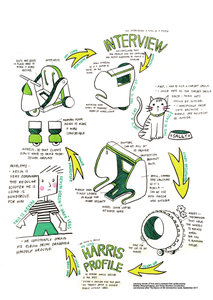Brochure from the Inauguration of Klaas Dijkstra, professor Computer Vision and Data Science
DOCUMENT
![I’M A.I. IMage Processing and Artificial Intelligence [Inaugurele rede]](https://publinova-harvester-content-prod.s3.amazonaws.com/thumbnails/files/previews/pdf/20250506132441657988.LS20Brochure20Professorship20CVDS20FINAL20WEB2028129-thumbnail-400x300.png)
The central goal of this study is to clarify to what degree former education and students' personal characteristics (the 'Big Five personality characteristics', personal orientations on learning and students' study approach) may predict study outcome (required credits and study continuance). Analysis of the data gathered through questionnaires of 1,471 Universities of Applied Sciences students make clear that former Education did not come forth as a powerful predictor for Credits or Study Continuance. Significant predictors are Conscientiousness and Ambivalence and Lack of Regulation. The higher the scores on Conscientiousness the more credits students are bound to obtain and the more likely they will continue their education. On the other hand students with high scores on Ambivalence and Lack of Regulation will most likely obtain fewer Credits or drop out more easily. The question arises what these results mean for the present knowledge economy which demands an increase of inhabitants with an advanced level of education. Finally, implications and recommendations for future research are suggested.
LINK
Industrial Design Engineering [Open] Innovation (IDE) is a 3-year, English taught, VWO entry-level, undergraduate programme at The Hague University of Applied Sciences (THUAS). The IDE curriculum focuses on the fuzzy front end of (open) innovation, sustainable development, and impact in the implementation phase of product-service design. The work field of Industrial Design Engineering and Open Innovation, like many other domains, is growing increasingly more complex (Bogers, Zobel, Afuah, Almirall, Brunswicker, Dahlander, Frederiksen, Gawer, & Gruber, 2017). Not only have the roles of designers changed considerably in the last decades, they continue to do so at increasing speed. Therefore, industrial design engineering students need different and perhaps more competencies as young professionals in order to deal with this new complexity. Moreover, in our transitional society, lifelong learning takes a central position (Reekers, 2017). Students need to give their learning path direction autonomously, in accordance with their talents and interests. IDE’s Quality & Curriculum Committee (QCC) realized in 2015 there is too much new knowledge to address in a 3-year programme. Instead, IDE students need to learn how to become temporary experts in an array of topics, depending on the characteristics of each new project they do (see Textbox 1). The QCC also concluded that more than just incremental changes to the current curriculum were needed; thus, the idea for a flexible, choice-based semester approach in the curriculum was born: ‘Curriculum M’ (Modular). A co-creational approach was applied, in which teaching staff, students, alumni, prospective students, industry (including the (international) social profit sector), and educational advisors collaborated to develop a curriculum that would allow students to become not just T-shaped (wide basis, one expertise) professionals, but U- or W-shaped professionals, with strong links to other disciplines.
DOCUMENT
